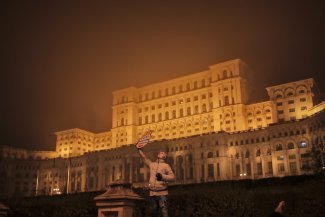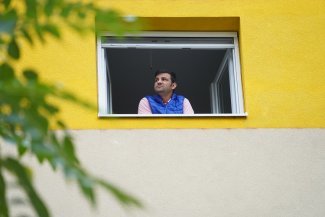
Last summer, civil society rallied against the continued erosion of democratic space in Romania after proposals to protect whistleblowers were significantly weakened by the government of President Klaus Iohannis (centre). Today, even after the law has been adopted, the fight continues.
According to the 2019 EU Whistleblowers’ Directive, each EU member state must amend its legislation to meet international standards. But a group of more than 20 NGOs and labour unions in Romania have accused the government of violating the rights of whistleblowers by diminishing existing protections with the “selective transposition” of the directive.
Romania’s whistleblowing legislation dates to 2004 and, at the time, it was believed to be one of the most progressive on the continent, says Anna Myers, executive director of the Whistleblower International Network. “According to the 2004 whistleblowers’ legislation, Romania was very good in terms of choice of channels, and it was ahead of many other European actors”.
Then, in 2019, the European Whistleblowing Directive on the protection of persons who report breaches of EU law passed, mandating every EU member state to amend its legislation by 17 December 2021 to meet the new standards. The directive pushed for more internal and external reporting mechanisms, and mandated private companies with over 50 employees to implement adequate reporting channels, amongst other measures.
Initially, Romania failed to pass any new whistleblower legislation and due to this delay in adoption, the EU began infringement proceedings against the government in June 2022. In September, the Commission gave the Romanian government two months to pass a new law, following the requirements and the recommendations of the directive, or else Romania could face the European Court of Justice.
The first draft was amended by the country’s Legal Commission on 28 June before being quickly adopted by the Chamber of Deputies the following day. However, rather than bolster the existing law, the amendments stripped the existing legislation of important legal protections. Crucially, it removed the principle of good faith of the public interest whistleblower, and it prohibited people from anonymously reporting wrongdoings inside a company or publicly reporting any wrongdoing unless three months passed since a formal internal complaint was filed (and received no answer).
Obstructing whistleblowers and a “lack of transparency”
Cristinel Godinac, executive president of the FairMedia Media and Culture Trade Union Federation, described the changes as “a slap in the face to those who still have the courage to expose abuses and corruption”.
Although it is difficult to say why the government passed these contentious amendments, critics have accused the government of wanting to obstruct whistleblowers and tighten the grip of the state.
Upon hearing the news of the proposed changes various NGOs, opposition MPs and trade unions mobilised to fight against them. Radu Nicolae, president of the Association for Cooperation and Sustainable Development, a Romanian NGO pushing for sustainable public policies, said that he was called to attend a Parliamentary Commission in June 2022 to present his opinion on the changes.
“I, and my other colleagues from various organisations, spoke and presented our arguments. Regardless of our efforts, the voting machine was unbeatable. Even off the record, when a break happened, the people we talked to said that while they understood our arguments, there wasn’t anything that they could do. A lack of transparency loomed over the room.”
The lack of transparency in Romanian law-making was already on everyone’s lips after an anonymous leak revealed that the Romanian Intelligence Service (SRI) was drafting a law to give itself more powers and strip the state of mechanisms to investigate its activities. Furthermore, in June 2022, the Ministry of Research and Development pushed a €500 million contract to develop governmental cloud systems towards the SRI, without explanation.
Research published in July 2022 by Oxford Analytica noted that Romanian president Klaus Iohannis’s turn towards the military and intelligence services marked an erosion in Romania’s democracy, and that instead of helping those acting in the public good, the new whistleblower law would discourage them.
On hearing about the proposed amendments,civil society petitioned the Romanian Ombudsman, urging it to “attack” the proposed legislation at the Constitutional Court, but nothing came out of it. In a last-ditch attempt, centre-right politicians from the USR (Save Romania Union party) gathered enough signatures to bring the draft to the Constitutional Court, but to no avail.
“The proposed changes were given the green light by the [Constitutional Court] because it has the role of disciplining whistleblowers,” says Nicolae. “The mentalities and values that they are expressing are foreign to those that I wish the state’s institutions would have. This type of legislation is not consonant with the values and behaviours in which [most Romanians] grew up,” says Nicolae, pointing to the values of active citizenship and solidarity that the Romanian education system purports to foster.
At the last minute, President Iohannis, sent the law back for a second round of amendments in Parliament, prompted, mostly likely, by the possibility of EU funds being withheld due to the improper transposition of the directive putting Romania at odds with the principles of the rule of law. As a result, on 1 September 2022, the Senate adopted a new law that better reflected the requirements of the directive. This law was finally promulgated on 16 December 2022.
“Legislative butchering”
The new bill eliminates the requirement of coming out publicly, but when submitting a complaint, employees must provide some contact information. However, it is not mandatory for whistleblowers to give their personal e-mail address, so creating a burner account for this sole purpose is a possibility. Nicolae does not regard this as a specific problem, since “using the IT department to stalk people is an abuse of power. To use the resources of a public institution is an abuse, almost a crime”. Not everyone agrees with his stance, however, since other NGOs dealing with whistleblowers’ rights have been quick to condemn this new requirement.
The new bill also mandates private companies with more than 50 employees to create internal communication channels where whistleblowers can safely share the information that they have. Additionally, if a whistleblower is brought in front of a commission to testify or to discuss the information that he or she leaked, a workers’ representative, a union member or a journalist must be present in the room to offer another level of protection against abuses.
However, the new law also introduces a clear hierarchy that whistleblowers must follow when reporting a problem which may discourage the reporting of institutional wrongdoing. If a whistleblower does not trust the internal channels available to them, they may think twice about taking action. Nicolae denounces this hierarchy as he says it goes “against the non-regression clause [which means that member states cannot weaken the legislation they already have].”
Aside from those changes, the new bill removes certain principles that have previously set the tone on how the state deals with whistleblowers. According to the previous law, the public interest and good faith (whistleblowers were encouraged to report to improve the quality of institutions) were fundamental. Under the new law, those principles are gone from the legislation, and public disclosure is discouraged since certain conditions must be met.
However, Godinac from FairMedia says that despite the “legislative butchering, we will continue to support whistleblowers by providing them an online tool through which they will be able to report anonymously the problems”.












